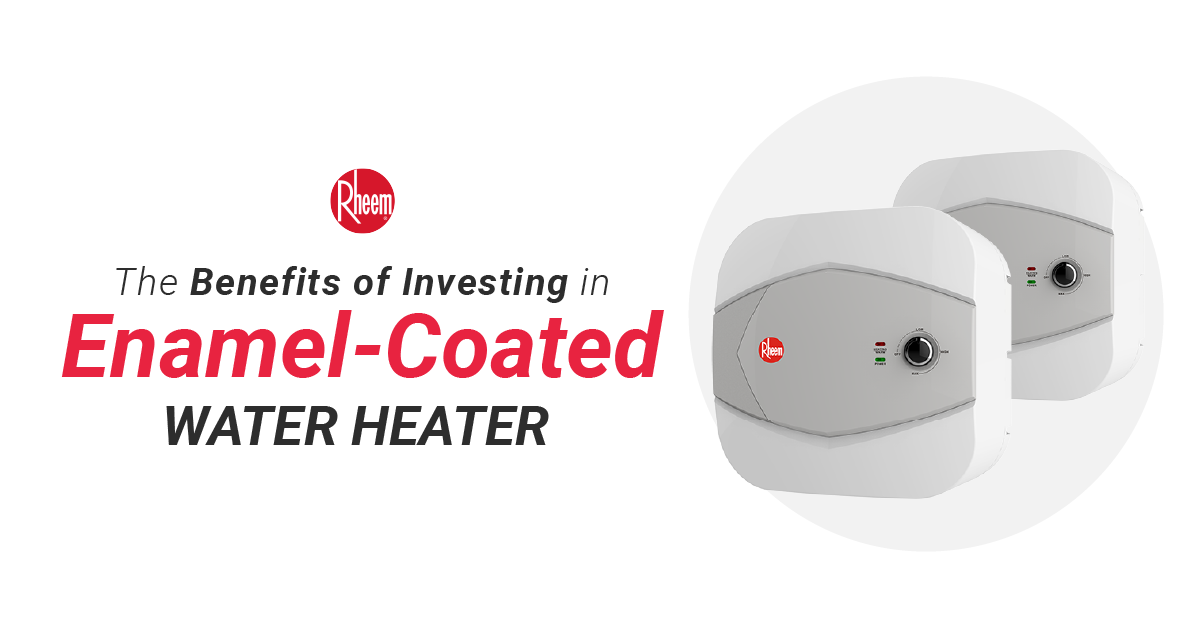
With warm water consumption becoming an integral part of many people’s lives in the Philippines, investing in reliable and long-lasting water heaters has become paramount for many. A unit’s material build is one of the top considerations when choosing new heaters, especially with its significant impact on the heater’s performance and longevity.
Considering the materials used to build an electric storage water heater provides several benefits that can make the heater a worthwhile investment. For starters, the water heater’s durability depends on whether manufacturers utilized stainless steel or copper on the unit, affecting the unit’s lifespan and corrosion-resistance capabilities. In addition, it can also affect the heater’s efficiency, as various materials retain and distribute heat differently.
While brands use different types of materials for their water heaters, enamel coating is becoming more popular as time goes by. Enamel-coated water heaters have been the top pick for years because of their remarkable resistance to scratches, stains, and water damage.
Enamel coating refers to a mixture of finely ground glass particles, pigments, and additives that enhance the adhesion and viscosity of the final product. Enamel can be applied on various surface types, such as metal, glass, and ceramics. It is a versatile solution for those looking for long-lasting and corrosion-resistant appliances or furniture.
There are two main types of enamel coating brands might use on their products: painted and porcelain enamel.
It is no secret that water heaters are highly prone to corrosion and premature wear and tear, especially if high amounts of sediments are present in the water are stored in the unit. This can easily damage the heater’s internal components, leading to significantly reduced efficiency and functionality, as well as possible costly repairs.
One of the prime advantages of going for enamel-coated water heaters is their remarkable capability to protect the external and internal parts of the storage heater from various corrosive elements. This acts as a barrier between the sediments and the heater’s metal structure, ensuring the structural integrity of the unit for a long time.
The benefits of enamel-coating regarding water heaters go beyond just the protection of the components, as it can also contribute to improved energy efficiency. Enamel makes the surface of the heater’s internal components much smoother, allowing for efficient heat transfer between the heating element and the water. This significantly reduces the time the heating element should operate to warm the stored water, which saves energy for a long time.
In addition, enamel coating also helps prevent scale buildup, which can accumulate in the tank and pipes due to high levels of sediments in the water. This is a common issue for many water heaters, leading to reduced efficiency as the unit works harder to operate at optimal levels. Enamel coating ensures that the minerals will not be stuck in the tank and pipe walls, helping the heater become more effective while using less energy.
Apart from this, enamel coating acts as an insulating layer which curtails heat loss. This is crucial as stored water typically loses its heat to the surroundings after a particular time frame, resulting in the heater constantly working to keep the required temperature of the water. The insulation capabilities of enamel coatings on water heaters mitigate frequent heating cycles, which can reduce energy consumption.
Enamel coating in water heaters also dramatically ensures that the water coming out of the faucet is clean and free from harmful sediments. Enamel makes the internal walls of the tank and pipes non-porous, restricting the growth of bacteria and microorganisms. This helps maintain the water’s cleanliness and hygiene, primarily if it will be used for cooking or drinking.
And since enamel can prevent the metal components of the heater from rusting or corroding, it can prevent metal contaminants from mixing with the water. This and enamel’s capability to avoid sediment accumulation can reduce impurities that impact water quality.
Enamel coating allows for lesser maintenance work on the heaters, helping homeowners save time and money in the long run. Their high corrosion-resistant capabilities minimize damage to the unit’s internal and external structure, reducing the possibility of leaks and water damage. Furthermore, the resistance to sediment buildup reduces the need for persistent flushing and cleaning, dwindling the storage heater’s downtime.
Moreover, the smooth finish of enamel coating makes it easier to clean than rough and textured surfaces. Enamel does not trap debris or dirt, which usually makes cleaning harder than expected. This also extends the heater’s lifespan, allowing for reduced replacements of components or repairs on various moving parts.
With the need for durable and efficient water heaters becoming paramount for many, enamel coating has helped revolutionize how numerous modern storage water heaters function. This helped brands provide consumers with a reliable water heater that can be used for various activities, including showering, dishwashing, cooking, and cleaning. Investing in enamel-coated heaters enables property owners to have a unit that promotes optimal efficiency and allows them to save money in the long run.
If you want high-quality storage water heaters made with enamel coating, you should check out Rheem, one of the best water heater brands in the Philippines. With almost 100 years in the water heating industry, we have constantly focused on innovating and creating more advanced, high-quality water heating solutions to suit our customers’ unique needs.
You can browse our extensive range of tankless and electric storage water heaters on our website. For any inquiries or more information about our products, you can also talk to one of our representatives at www.rheemphilippines.com/contact.

Subscribe

At Rheem, we strive to innovate
best-in-class products to lead the industry
in
environmental improvements.
Sustainability

